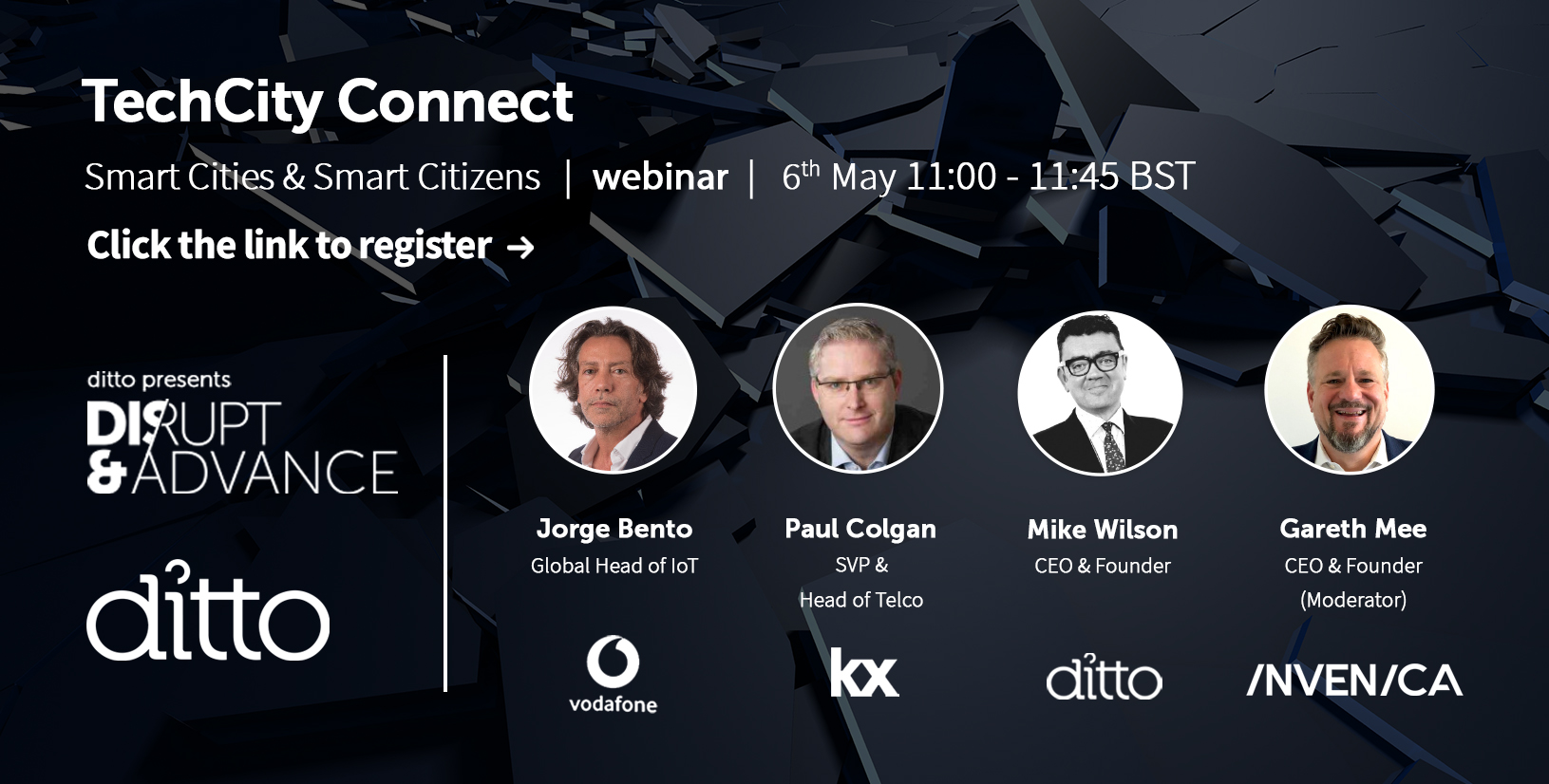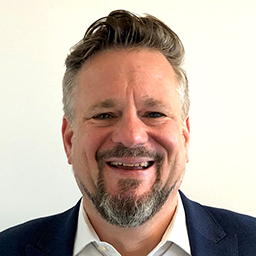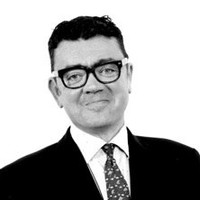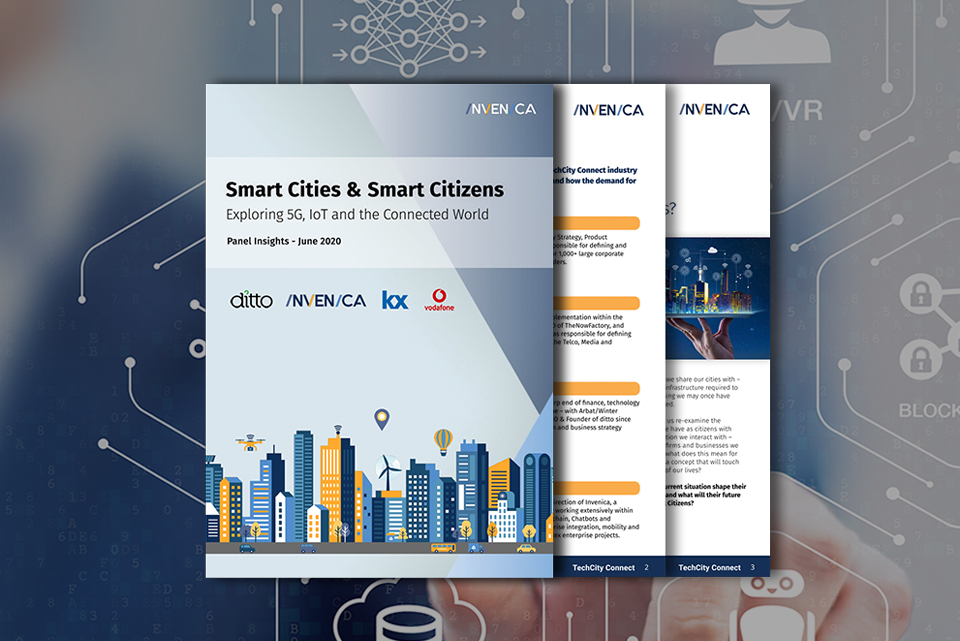
Smart Cities & Smart Citizens - Exploring 5G, IoT and the connected world
Smart Cities & Smart Citizens - Exploring 5G, IoT and the connected world
The digital world creates huge opportunities for businesses and people to thrive, but it also presents challenges.
Even with all the technology at our fingertips, it can be tough to stay connected; especially at these difficult times where remote working is more vital than ever.

On the 6th May, Invenica took part in TechCity Connect, a day of 12 digital events in Tech, Art & Culture.
As part of this series, our CEO Gareth Mee moderated the Smart Cities & Smart Citizens webinar. He was joined by a panel of experts from Vodafone, Kx and ditto tv to explore the future of digitalisation in urban areas.
Smart Cities: The Facts of IoT & Blockchain Webinar
Our whole notion of what Smart Cities represent is being challenged. We thought it would revolve around the ideas of connectivity, convenience and access. However, we’re currently seeing just how much impact our demand for services has on the people around us – and the infrastructure delivering everything we may have once taken for granted.
In this webinar we discover what will the cities of tomorrow look like – and how will the demand for digital services from citizens drive their development? In this webinar we uncover the daring vision of a digital future, and the technologies that will be vital in realising it.
"The science will be on how we manage to bring all these technologies together as an ecosystem"
Jorge Bento, Global Head IoT, Vodafone
“Blockchain is the tech that will change the world, it’s just a matter of when. CordaCon demonstrates just how mature the space is becoming, with large corporates and real use cases.”
Gareth Mee, CEO, Invenica
"We need people with entrepreneurial spirit to jump into these new concepts, making use of this technology to explore new revenue streams."
Jorge Bento, Global Head IoT, Vodafone
"Carriers have been doing quite a lot of POCs over the last two years and now they're hungry for adoption, we're seeing an interest from them wanting to go into production and drive this technology forward"
Thomas Spencer, Business Development Director & Telecom Lead, R3
"I think the blockchain will develop further in order to cope with the amount of data. ."
Gareth Mee, CEO, Invenica
Are Smart Citizens the Key to Successful Smart Cities?
As part of ditto’s TechCity Connect series, Invenica explored what Smart Cities might look like; how the current crisis will reshape our vision for them, and why Smart Citizens will play a key role in their development.
Do we need a new vision for Smart Cities?
Whether people are ready or not, Smart Cities are here. The demand for the technology behind their development is already huge and will only keep growing. A report from PwC predicts that the global Smart City market will hit an annual growth rate of 23% by 2024, reaching a value in excess of $2tn (PWC, 2019). But what does it mean for the people living in these urban areas?
Today, the whole notion of what Smart Cities represent is being challenged. We thought it would revolve around the ideas of connectivity, convenience and access. Co-working spaces, better transport, and linked services are all
hallmarks of what our IoT-connected cities deliver.
However, we now live in a time where we’re faced with the effect our basic movements can have on the people and communities around us. We’re seeing directly how our demand for services (both public and private) creates actions and consequences for the people we share our cities with – as well as the impact on the infrastructure required to deliver everything we may once have taken for granted.
This is making us re-examine the relationship we have as citizens with every organisation we interact with – especially the firms and businesses we work with and for. So, what does this mean for Smart Cities, a concept that will touch on every area of our lives? How will the current situation shape their development, and what will their future hold for Smart Citizens?
Building Smart Cities around the people
Ultimately, the aim of any Smart City is to enrich the lives of its citizens – whether through better services or the creation of inclusive, healthy environments. That’s why any organisation involved in creating Smart Cities must now look beyond siloed solutions for bikes, bins, and benches, developing connected applications and systems that make a real difference to Smart Citizens. After all, if the essence of urban development is individual action, a city can only be as smart as its citizens (Forbes, 2019).
In this way, outcomes will be hugely important in Smart Cities – including the ability to measure how our cities empower the new smart citizens to improve their rights, wellbeing, health, security, and prosperity. Demonstrating the power citizens will have to shape new ways of life will be essential.
Healthcare is a highly topical example, with the technology behind Smart Cities able to deliver increases in air quality and help reduce carbon dioxide levels – improving public health and reducing demand for healthcare services. As well as freeing up vital resources within the healthcare system, this adds to people’s quality of life – an essential element in building Smart Cities that empower people, rather than creating places they simply exist in.
That’s why the focus needs to be on the people. Smart Cities need to empower their citizens to reimagine their lives – going beyond siloed novelties to create urban areas connected with technology that enables new and frictionless ways of interacting with the people and organisations around them.
Why Smart Cities can’t grow in isolation
Another key question regarding the Smart City is how it connects and engages with other Smart Cities. How do we encourage a shared set of standards, frameworks and applications that allow urban areas to learn from the successes of others? How can it adopt methods and applications to achieve the same outcomes for its own citizens, as well as travelling citizens from other cities? The answer is a Smart City ecosystem that allows interoperability between urban areas.
All of this is part of a wider conversation around Smart Cities and Smart Citizens that’s shifting and reshaping itself. What will the urban areas of tomorrow look like? How will the Smart City vision change, based on the current global situation? And, ultimately, how do they empower Smart Citizens to shape the world they live in?




Our Speaker Bios
Gareth Mee is responsible for the growth and strategic direction of Invenica, a specialist software services business. He is currently working extensively within the emerging technologies space covering AI, Blockchain, Chatbots and Conversational Language, with experience in enterprise integration, mobility and UX – delivering mission critical solutions and complex enterprise projects.
Jorge Bento has been leading Vodafone Business’ technology practice for IoT over 6 years. Jorge leads Vodafone Group’s overall IoT Technology Strategy, Product Management, Engineering and Innovation. Jorge works primarily with Vodafone Business stakeholders, large corporate customers who have a variety of different IoT services globally; and Vodafone’s strategic partners to enable joint go-to-market propositions. Jorge is responsible of defining and delivering worldwide IoT platforms and solutions for 1000+ large corporate customers and other communications service provides, working internally with pre-sales, sales and various operational functions. This covers a variety of different business sectors, from Automotive where Vodafone leads the market, to Insurance, Logistics, Healthcare, Energy and Utilities, and more.
Paul Colgan is responsible for leading Kx’s strategy and implementation within the Telcommunications market. Prior to Kx, he was CTO of TheNowFactory, a network analytics company acquired by IBM in 2014. At IBM, as Communications Sector Leader, he was responsible for defining and delivering their Analytic Solutions globally for the Telco, Media and Entertainment industries. He started his career as a developer at Logica Mobile Networks (CGI) before moving to Openet where he spent a number of years working in their core mediation development team.
Mike Wilson has spent a 30+ year career working at the sharp end of finance, technology and media globally, based in Asia, the US and Europe – with Arbat/Winter Partners, UBS, Bankers Trust and Deutsche Bank. CEO & Founder of ditto since 2008 – an award-winning marketing, communication and business strategy practice dedicated to FinTech. Working across the business lifecycle – from start-up strategy, investment roadshows and post-funding “go-to-market” activation – through to producing multi-million/multi-region product launches and campaigns for FTSE 100/Fortune 100 firms. Helped bring to market firms such as BMLL, Cobalt, Form3, Illuminate Financial, Privitar and Thomson Reuters Elektron.




